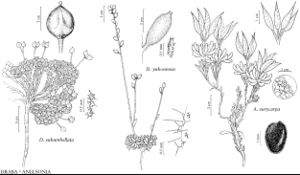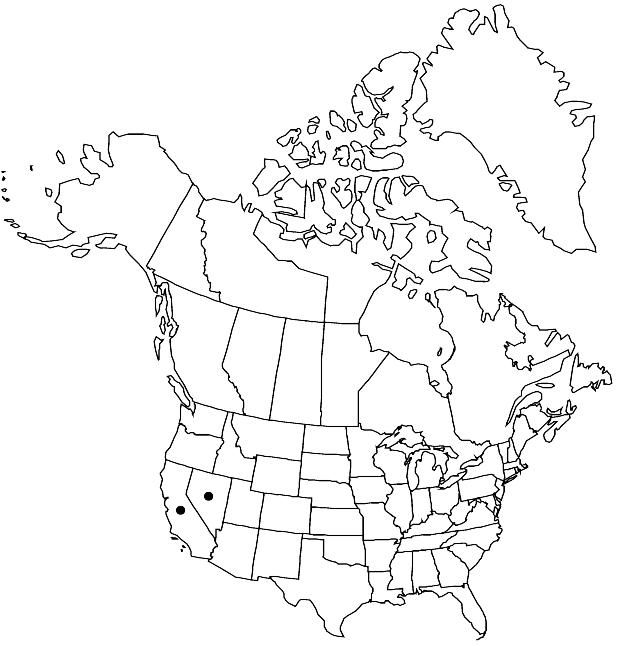Draba subumbellata
Aliso 12: 25, figs. 1k–n, 4. 1988.
Perennials; (cespitose, densely pulvinate); caudex branched (densely covered with persistent leaves and remains, branches tightly grouped, sometimes terminating in sterile rosettes); scapose. Stems unbranched, (0.05–)0.1–0.25 dm, densely pubescent throughout, trichomes (grayish), stalked, dendritic, 5–12-rayed, 0.1–0.25 mm. Basal leaves (densely imbricate); rosulate; sessile; blade obovate to broadly oblong, 0.2–0.4 cm × 0.6–1.5 mm, margins entire, (not ciliate), surfaces densely pubescent, trichomes (grayish), stalked, dendritic, 5–12-rayed, 0.1–0.3 mm, (sometimes with long-stalked and spurred trichomes adaxially). Cauline leaves 0. Racemes 2–5(–10)-flowered, ebracteate, subumbellate or slightly elongated in fruit; rachis not flexuous, pubescent as stem. Fruiting pedicels divaricate-ascending, straight, 1.5–3(–6) mm, glabrous or pubescent as stem. Flowers: sepals broadly oblong, 1.8–2.8 mm, pubescent, (trichomes dendritic); petals yellow, spatulate, 2.8–4 × 1–1.5 mm; anthers ovate, 0.3–0.4 mm. Fruits ovoid to ovoid-lanceolate, plane, inflated and sometimes subgibbous basally, flattened distally, 2–5 × 2–3 mm; valves pubescent, trichomes short-stalked, dendritic, 4–12-rayed, (sometimes spurred), 0.05–0.2 mm; ovules 6–12 per ovary; style 0.2–0.6 mm. Seeds oblong, 1–1.2 × 0.5–0.7 mm.
Phenology: Flowering Jul–Aug.
Habitat: Wind-eroded areas, alpine fellfields, rock crevices
Elevation: 3300-4100 m
Discussion
Draba subumbellata is similar to, and sympatric with, D. oligosperma. It is distinguished from the latter by having stalked, stellate to dendritic leaf trichomes, subumbellate racemes, fruiting pedicels 1.5–3.0(–6.0) mm, fruits pubescent with mostly 4–12-rayed trichomes, and well-formed anthers and pollen. By contrast, D. oligosperma has sessile or subsessile, pectinately-branched leaf trichomes, elongated racemes, fruiting pedicels (2–)3–10(–13) mm, fruits glabrous or pubescent with simple and 2-rayed trichomes, and abortive anthers and/or pollen. Draba subumbellata is restricted to the White Mountains (Esmeralda County, Nevada, and Mono County, California) and to Coyote Ridge in the Sierra Nevada (Inyo County, California).
Selected References
None.

